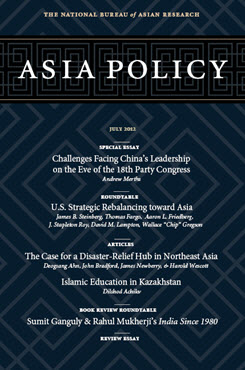Islamic Education in Central Asia
Evidence from Kazakhstan
This article examines the dynamics and implications of Islamic education in the post-Soviet Republic of Kazakhstan.
EXECUTIVE SUMMARY
MAIN ARGUMENT
The current state of Islamic education in Kazakhstan requires comprehensive reforms, owing to a gap between the need for Islamic education and the lack of necessary resources such as institutional facilities and trained imams. This deficit in Islamic education seems to emanate from (1) unbalanced government regulation of religion, (2) shortsighted fears of Islamic revival, and (3) an insufficient allocation of resources. Islamic educational institutions are instrumental in educating indigenous Islamic scholars and spiritual leaders who can promote mainstream, nonradical teachings in local communities. The lack of access to Islamic education not only undermines the prospects for promoting mainstream teachings but also increases the risk of foreign-supported radical groups recruiting uninformed Kazakh youth.
POLICY IMPLICATIONS
- The Kazakh government can play a proactive role by providing greater institutional infrastructure for mainstream Islamic learning, which could help deter the spread of radicalism. The government would benefit from viewing Islamic educational institutions as an opportunity rather than as a threat to Kazakhstan’s long-term well-being.
- Because investing in Islamic educational reforms is a slow, evolving process without immediate results, measurable outcomes of comprehensive reforms in education could potentially take years. Thus, policymakers should be mindful of the time frame involved in reforming educational systems.
- Policies to enhance Islamic education, however, must not curtail wider religious freedoms. Therefore, international actors need to play proactive roles in helping monitor and prevent state repression of religious freedoms in Central Asia.
Asia Policy 14 is supported in part by a grant from the Ford Foundation.
About Asia Policy
Asia Policy is a peer-reviewed scholarly journal presenting policy-relevant academic research on the Asia-Pacific that draws clear and concise conclusions useful to today’s policymakers. Asia Policy is published quarterly in January, April, July, and October and accepts submissions on a rolling basis. Learn more


